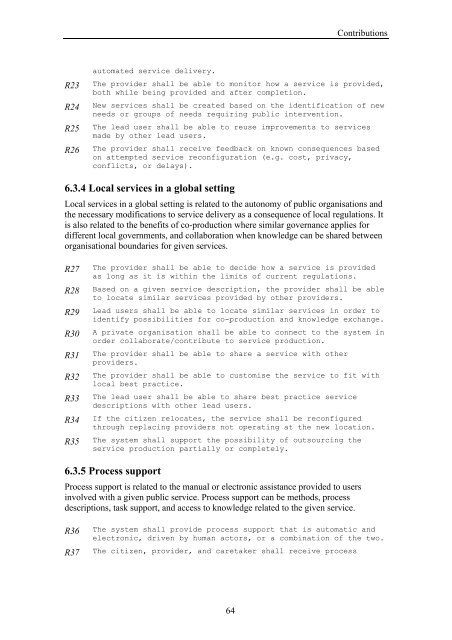Multi-channel provisioning of public services - Department of ...
Multi-channel provisioning of public services - Department of ...
Multi-channel provisioning of public services - Department of ...
You also want an ePaper? Increase the reach of your titles
YUMPU automatically turns print PDFs into web optimized ePapers that Google loves.
Contributions<br />
R23<br />
R24<br />
R25<br />
R26<br />
automated service delivery.<br />
The provider shall be able to monitor how a service is provided,<br />
both while being provided and after completion.<br />
New <strong>services</strong> shall be created based on the identification <strong>of</strong> new<br />
needs or groups <strong>of</strong> needs requiring <strong>public</strong> intervention.<br />
The lead user shall be able to reuse improvements to <strong>services</strong><br />
made by other lead users.<br />
The provider shall receive feedback on known consequences based<br />
on attempted service reconfiguration (e.g. cost, privacy,<br />
conflicts, or delays).<br />
6.3.4 Local <strong>services</strong> in a global setting<br />
Local <strong>services</strong> in a global setting is related to the autonomy <strong>of</strong> <strong>public</strong> organisations and<br />
the necessary modifications to service delivery as a consequence <strong>of</strong> local regulations. It<br />
is also related to the benefits <strong>of</strong> co-production where similar governance applies for<br />
different local governments, and collaboration when knowledge can be shared between<br />
organisational boundaries for given <strong>services</strong>.<br />
R27<br />
R28<br />
R29<br />
R30<br />
R31<br />
R32<br />
R33<br />
R34<br />
R35<br />
The provider shall be able to decide how a service is provided<br />
as long as it is within the limits <strong>of</strong> current regulations.<br />
Based on a given service description, the provider shall be able<br />
to locate similar <strong>services</strong> provided by other providers.<br />
Lead users shall be able to locate similar <strong>services</strong> in order to<br />
identify possibilities for co-production and knowledge exchange.<br />
A private organisation shall be able to connect to the system in<br />
order collaborate/contribute to service production.<br />
The provider shall be able to share a service with other<br />
providers.<br />
The provider shall be able to customise the service to fit with<br />
local best practice.<br />
The lead user shall be able to share best practice service<br />
descriptions with other lead users.<br />
If the citizen relocates, the service shall be reconfigured<br />
through replacing providers not operating at the new location.<br />
The system shall support the possibility <strong>of</strong> outsourcing the<br />
service production partially or completely.<br />
6.3.5 Process support<br />
Process support is related to the manual or electronic assistance provided to users<br />
involved with a given <strong>public</strong> service. Process support can be methods, process<br />
descriptions, task support, and access to knowledge related to the given service.<br />
R36<br />
R37<br />
The system shall provide process support that is automatic and<br />
electronic, driven by human actors, or a combination <strong>of</strong> the two.<br />
The citizen, provider, and caretaker shall receive process<br />
64
















